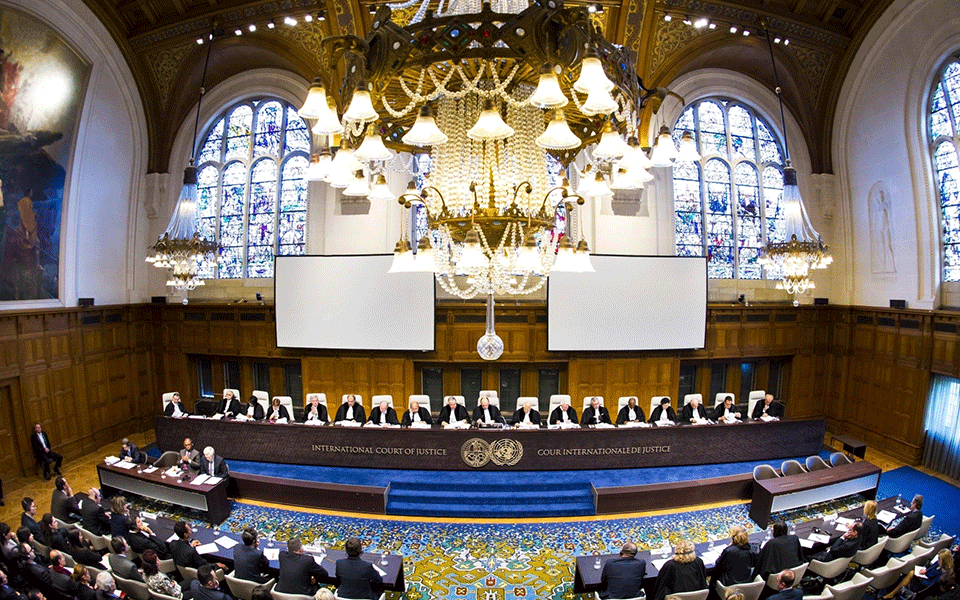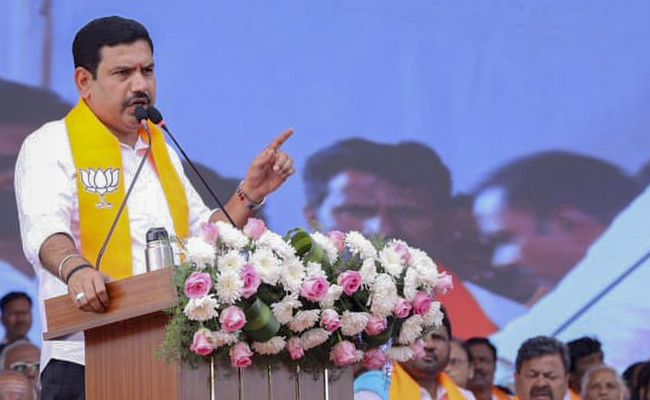The Hague, Oct 3 : The International Court of Justice (ICJ) on Wednesday ordered the US to lift sanctions linked to humanitarian trade, food, medicine and civil aviation imposed against Iran -- a move welcomed by Tehran.
Washington re-imposed sanctions on Iran after pulling out from the 2015 nuclear deal. Siding with Tehran, the ICJ said exports of "humanitarian" goods, such as food and medicines, should be allowed, the BBC reported.
US President Donald Trump moved to restore tough sanctions on Iran in May after announcing he was abandoning Tehran's nuclear deal with world powers.
He said the deal had "failed to achieve the fundamental objective of blocking all paths to an Iranian nuclear bomb" and did not deal with Tehran's "malign activities, including its ballistic missile programme and its support for terrorism".
Iran challenged the sanctions in a case filed in July at the court. It said that the sanctions violated the 1955 Treaty of Amity, Economic Relations, and Consular Rights between the two countries, which grants the ICJ jurisdiction over disputes.
The deal was originally signed between Iran and China, France, Russia, the UK, the US plus Germany and the European Union, which aimed to halt the Islamic Republic's nuclear weapons programme in exchange for lifting of economic sanctions.
Announcing the decision on Wednesday, the ICJ's President Judge Abdulqawi Yusuf said: "The court considers that the US must remove, by means of its choosing, any impediment (...) to the free exportation to the territory of Iran of goods required for humanitarian needs."
Washington was ordered to remove sanctions that would affect Iran's civilian population, namely the ones restricting medicine and medical devices, food products and spare mechanical parts vital for infrastructure, such as spare parts for aviation maintenance.
However, the US argued that the court had no jurisdiction in the case as it concerned its national security.
Reacting to the top UN court's decision, Iranian Foreign Ministry said: "The verdict by the Hague-based ICJ against the US unilateral sanctions, following its withdrawal from the 2015 Iranian nuclear deal, proves Iran's righteousness and US' illegitimate and oppressive sanctions."
The rulings of the ICJ, the main judicial organ of the UN, are binding but the court has no power to enforce them. It settles legal disputes between member states. But both Washington and Tehran have in the past ignored the court's rulings.
Following the announcement, US Ambassador to the Netherlands, Pete Hoekstra, called it a meritless case over which the court has no jurisdiction".
Iran's economy has slumped since Trump ordered that sanctions be reinstated. Its currency, the rial, has dropped sharply.
The International Atomic Energy Agency, which monitors Iran's adherence to the nuclear pact, had found that Tehran fully complied with the agreement.
The court's decision could encourage European companies, which ceased trading with Iran for fear of falling foul of Trump, to reconsider their position, specifically those dealing in the humanitarian items outlined by the judges, the report said.
Let the Truth be known. If you read VB and like VB, please be a VB Supporter and Help us deliver the Truth to one and all.
Bengaluru (PTI): The Karnataka Electricity Regulatory Commission has reduced electricity tariffs for agricultural pump sets for 2025–26 from the earlier uniform rate of Rs 8.30 per unit to a range of Rs 6.57 to Rs 7.79 per unit across the state.
However, the Commission has increased tariffs for select commercial and industrial consumers by 10 paise to a maximum of 95 paise per unit.
As per the Commission’s order, the revised tariffs are as follows: LT-3a (low-tension commercial) consumers will pay a fixed charge of Rs 235 per kW and an energy charge of Rs 7.10 per unit, while LT-5 (industrial) consumers will be charged Rs 165 per HP as fixed charges and Rs 5.20 per unit as energy charges.
In the high-tension segment, HT-2a (industrial) consumers will pay a demand charge of Rs 365 per kVA and an energy charge of Rs 6.70 per unit, while HT-2b (commercial) consumers will pay Rs 390 per kVA as demand charges and Rs 6.90 per unit as energy charges.
The revised tariffs were notified in an order issued on March 3 after the Commission allowed a review petition filed by five state-run electricity supply companies—Bangalore Electricity Supply Company, Mangalore Electricity Supply Company, Chamundeshwari Electricity Supply Corporation, Hubli Electricity Supply Company and Gulbarga Electricity Supply Company.
The order, however, does not specify the date from which the revised tariffs will come into effect.
In its earlier tariff order dated March 27, 2025, the Commission had fixed the LT-4a tariff uniformly at Rs 8.30 per unit across all ESCOMs.
Consumers in the LT-4a category — primarily agricultural pump set users — are provided free power supply, with the state government reimbursing the cost through subsidies.
According to the order, the petitioners informed the Commission that despite the Government of Karnataka allocating Rs 16,021 crore towards subsidies for free power supply to LT-4a consumers, the ESCOMs would not be able to fully recover the cost of electricity supplied under the earlier tariff structure.
The Commission noted that this would leave distribution companies with no option but to demand payment of the balance amount from farmers, leading to “unexpected and undue hardship” for the agricultural community, which it described as the backbone of the state’s agricultural production.
The reduction in the LT-4a tariff would, however, result in a revenue shortfall of Rs 2,362.47 crore compared to the tariffs considered in the order under review.
Observing that it was necessary to safeguard farmers’ interests while ensuring that ESCOMs reasonably recover costs, the Commission said the review petition could be allowed under the provisions of the Code of Civil Procedure, 1908.
The petitioners informed the Commission that the Government of Karnataka has allocated an additional Rs 2,362.47 crore, supplementing the existing budgetary provision of Rs 16,021 crore, recognising that the entire financial burden should not be passed on to consumers and must be partially borne by the government.
The petitioners further stated that they will mobilise Rs 1,107.60 crore through miscellaneous revenue.
“The balance shortfall to be met by increasing tariffs for industrial and commercial consumers, amounting to Rs 1,254.88 crore, appears reasonable and justifiable,” the Commission added.





